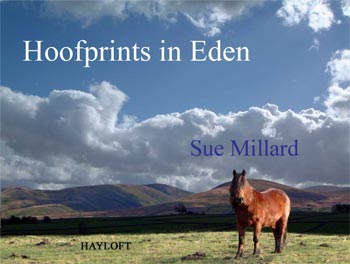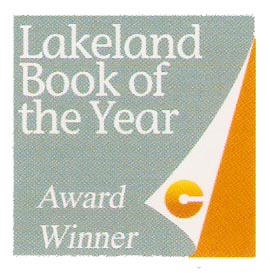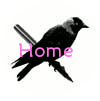Menu  Compare
Prices
Compare
Prices
Hoofprints in Eden - Reviews

 Winner
of
the Saint and Company Prize at the Lake District Book of the Year
Awards, 2006
Winner
of
the Saint and Company Prize at the Lake District Book of the Year
Awards, 2006
Paperback edition
By Royal Appointment
THE Duke of Edinburgh's office, at Buckingham Palace, has just ordered three copies of a new book published by Hayloft Publishing Ltd, Kirkby Stephen. Hoofprints in Eden, which was published in October, is written by Sue Millard, from Greenholme, near Tebay, and explores the history and present day situation of Fell ponies.
The Queen, who is patron of the Fell Pony Society, is a keen Fell pony breeder under the Balmoral prefix, while the Duke drives a team of Fell ponies in competition, including at the Lowther event.
The author said, "When we heard the news I was very excited - the whole family were smiling about it. It really is lovely to think that the Royal household wants to read about Fell ponies.' Cumberland & Westmorland Herald, 12 November 2005
Recollections
I have just obtained an interesting series of recollections by people who really know their Fell Ponies. It's a book called Hoofprints in Eden by Sue Millard, a member of Out of Town with Jack Hargreaves (Facebook group based around the work and interests of the author and TV broadcaster). It's an oral history with transcripts of interviews with traditional Fell Pony breeders - men and women who might not be heard outside their own sphere. Sue is a citizen of that sphere - historian, promoter of the Fell Pony breed, and a show judge. Jack would have dipped regularly into this book for its rich reference to places and people and dialect in one of the few places - Eden to Sue - that might yet be called 'remote' for all its location close to the 'Lake District' known to millions of visitors. Fell Ponies are the subject of episode 8 on disc 1 of Network's Out of Town Vol 1. A pair of Fell ponies draw the Cape Cart that Jack, and a friend, research and construct in episode 6, disc 5 of Network's Old Country. How many here know the Fell Pony? When I was studying anthropology at university I was taught by Prof Meyer Fortes about the Nuer people of Southern Sudan; pastoralists who herd cattle - animals which serve as companions and which define their lifestyle. Studying Sue's book, I can see how the ponies of the fell define and fulfil a way of life. Simon Baddeley, April 2020
***** Hoofprints in Eden
This review is from: Hoofprints in Eden
(Paperback)
This book gives a fascinating insight into the world of Fell pony
breeders. The interviews with the breeders are very revealing and their
candid views into the breeding world of the Cumbrian and Northumberland
fells are incredibly interesting. These coupled with the in-depth
knowledge of the author make this a book I would recommend to all Fell
pony enthusiasts. I am a lover of the (black) hairy beasts and this book
makes me wish I could live on the fells as these breeders do! Fellmare
(Amazon
UK), 21 Jan 2013
***** Wonderful snapshot of the life of hill breeders
This review is from: Hoofprints in Eden
(Paperback)
When you read this unique insight into the life of hill farmers you
almost feel like you are intruding. Millard has captured the sense of a
fast disappearing way of life. The book is captivating and I thoroughly
recommend it. Miss Kate White "Kit" (Amazon
UK), 20 Jan 2013
***** An engaging record that will be a boon for future historians
This review is from: Hoofprints in Eden
(Paperback)
Sue Millard has managed to achieve something
exceptional here - a book that offers the reader an experience that is
close to an oral history recording. In the first few pages she invites
us to enter the kitchens of the Fell pony breeders of the Cumbrian
fells, just as she did, and listen to their anecdotes. It's a witty and
poignant record of the harsh way of life of hardy folk, whose everyday
language indicates clearly their direct descent from Norse settlers on
the fells and in the Dales of upland Britain. This is a point that's
made in the glossary, and it's well worth making, for in the desire to
find ancient origins for British breeds of ponies, Norse influence tends
to get overlooked in favour of Roman, Iron Age or others. This is a
point that's also made in Andrew Fraser's book on Scottish horse breeds.
In "Hoofprints in Eden", the author contends succinctly with theories about, for instance, the possible influence of Friesian type horses on the breed dating from the presence of Roman cavalry auxiliaries. Most of the book is about the 19th, 20th and 21st centuries, however, the date of the foundation of the Fell breed as distinct from the Fell, or Fell-Galloway type.
The history is secondary to the voices of the breeders and also to historical records of various journals about individual Fell ponies themselves. It all blends and flows very well together and the photos are excellent. The author has not often allowed her own voice or opinions to intrude into these first hand descriptions, but she has an excellent turn of phrase when she does. On writing of Fell ponies in endurance riding, for instance, she writes: "They don't have the long legs of their Arab cousins but they do have a turbo trot that, once fuelled by competition, leaves the Orientals wondering what it was that went by in that flurry of hairy legs."
"Hoofprints in Eden" is an entertaining and educating memoir that will without doubt be as valuable a resource for future historians of the horse, as it is for those of the present day. Amazon UK By HorsebackHistorian 4 Nov 2013
***** Native to Britain
Fell Ponies are one of the breeds of pony native to Britain, and their development and preservation is innately bound up with the farming practices and way of life of the families who have bred them for generations. This book is a fairly in-depth piece of oral history on their attitudes and practices, with much of the text being made up of quotes from interviews with traditional Fell Pony breeders. The information is well organised, with many quote on a topic being grouped together. It gives a voice to men and women who would not otherwise be heard outside of their own sphere.
Sue Millard is well known in the Fell Pony world as a historian and promoter of the breed, and a show judge. She is also a professional writer. All these things show in the way this book is organised and presented. I would recommend this book to anyone interested in native British ponies, or in farming practices of the Pennines. Kris on Goodreads, August 2012
Digital Edition
17 February 2021
***** Very good read
Very good!
Reviewed in the United Kingdom by Stacy Longrigg
7 December 2020
***** Best Fell Pony book out there
This book gives you the responses from many respected and long time breeders....a computation of answers not one person opinion based on one or a couple observations. Highly recommend! Reviewed in the United States by Lori Welbig
6 January 2017
***** Kindle Edition
Lovely book explaining the breed characteristics with insights from the now sadly diminishing band of hill farmers who have preserved the breed. RoyH
Post-Christmas comments December 2013
"...I am so glad I bought it, it's a fascinating read... "
"...The book is just of inestimable value for anyone who owns or loves Fell Ponies...Your book has inspired me to consider how I could go about traveling to England and seeing for myself the natural environment of this breed and meeting the people who are responsible for protecting and carrying on with the treasure that is the Fell Pony." Cathi Cline, 29 Dec 2013
"...Hoofprints in Eden - thank you for sharing your knowledge and research on our fantastic breed. Having been given the book for Christmas (was in the top of my list), I can't put it down. Brilliant!" Hazel Gunter, 26 Dec 2013
***** A Treasure
I own a Fell pony. This book brings the environment and the crusty codgers who bred the Fells on the windswept British crags to life. I am motivated to take a trip to see the places and meet some of the unique characters that the author so beautifully describes. A treasure of history in an entertaining package. Amazon USA 29 Nov 2013
Cover remarks
'Hoofprints in Eden' very successfully captures the recollections and
experiences of long-established Fell pony breeders, revealing much about
the customs and practices of keeping ponies on the open fell and about
the hill farmers and enthusiasts who worked tirelessly to save the breed
from possible extinction. Their candid contributions, which form the
basis of this book, make fascinating reading and represent an unique and
valuable addition to the material already published on the breed.
Thoroughly recommended.
Clive Richardson, Fell Pony historian and past secretary, Fell Pony
Society, 2005.
Enthusiast traces Fell ponies' hoofprints over the centuries
Fell ponies are a familiar sight in Cumbria, roaming about the hills and moors in remote areas, working in farm fields and enlivening the rings at agricultural shows - but how much do you know about these tough, hardy, compact little animals? Anybody who wants to learn more can do no better than buy a copy of 'Hoofprints in Eden: Nobbut Thirty Years', a book of stories and detail about the breed, which has just been published.
Fascination in a topic is essential to the writing of a successful book. And Sue Millard is clearly besotted by Fell ponies.
'Living at Greenholme, I am surrounded by fell commons: the Howgills, Roundthwaite, Birkbeck and Crosby,' she writes. 'I have been a user, admirer and owner of Fell ponies for over 30 years.'
She sees the 'Fell' as unique - a view clearly shared by many of the breeders, past and present, whose names crop up in the course of the 240-page book. Jos Dargue, Sarge Noble, Frank Wales, Eddie Wilson, Jimmy Bell, Henry Harrison, Chris Thompson, Ted Benson, Bill Potter, Bert Morland, David Trotter, Thomas Capstick and Barry Mallinson, are some of the names of men whose ponies have run on the Cumbrian fells. Ladies, too, have been associated with the furtherance of the breed, among them Mrs Ailie Newall, Corbridge, Fell Pony Society secretary Peggy Crossland, and Mrs Sylvia McCosh, a daughter of Major Edward W. Hasell, Dalemain, Penrith.
Many people admire the ponies at agricultural shows. They were exhibited at Orton as far back as 1860 and soon afterwards at Shap show, described as 'one of the best in the district'. Temple Sowerby, Hesket-new-Market, Brough and Ireby were among other village shows with Fell pony sections, with Penrith prominent among town exhibitions. There was a lively side to Fell ponies when they took part in endurance riding and trotting races, some of them at shepherds' meets and other farming gatherings. The racing of trotting horses and ponies ranked alongside cock-fighting and wrestling as north-country spectator sports, with bookmakers always in attendance.
At the Newbiggin (Ravenstonedale) sports, the trotting races were both 'open' and 'confined to horses of the parish'. The Whartons of Sunbiggin and the Hullys of Bousfield are mentioned in the book as rival supporters of the sport. Trotting races were also part of the fun at the Orton pot fair, in the early 1900s.
A showground controversy of 1880 is recalled in the book by means of an extract from the 'Herald'. First prize in the pony sweepstakes was won by a 'fine-actioned animal' belonging to Mr Davidson, Shepherd's Hill, Penrith. A Mr Hall, of Melmerby, whose 'rough-legged pony' was placed second, entered a protest, on the grounds that the winner was above the specified height of 14hh - but the animal was found to be in order, according to the rules.
The book is largely historical and reminiscent, with memories from enthusiasts like Sylvia McCosh, Bill Potter and Frank Wales and a picture of an old character, Joe Baxter, of Guardhouse, Threlkeld, who used to walk a stallion, 'Master John', around farms in the area.
What of the future? Fell ponies are given an 'endangered' status by
the Rare Breeds Survival Trust. But Sue Millard is more optimistic and
writes: 'I hope there will always be new people coming into the breed,
who are willing to learn from the original breeders.
'Fresh minds, combining local knowledge with their own, may well find
new avenues that the versatile and robust Fell pony might explore, and
thus assure its future.' John Hurst writing in 'The Cumberland
& Westmorland Herald', 5 November 2005
Fell ponies - a record of their history and tradition
The Fell pony, rich in a history that is forever entwined with the unique uplands of the region, has slowly but surely attracted admirers around the globe.
Around 500 registered Fells live in Holland, with further examples of the breed to be found in America and parts of Europe and Scandinavia. But no matter where Fell pony enthusiasts are based, they can now acquaint themselves with the tales, traditions and local practices surrounding the keeping of the breed on the county's hilltops through a South Lakeland author's latest book.
After spending some two years collecting information and stories from Fell pony breeders, Sue Millard was finally able to sit down and begin writing 'Hoofprints in Eden' - whish she hopes will go some way towards quenching a thirst for knowledge on the native breed from its many fans. Having owned, kept and competed Fells for more than 30 years, the Greenholme-based enthusiast knows a thing or two about the hardy ponies said to have originated in Roman times. But it was the old tales and methods known only to some of the oldest Fell families in the area that she wanted to safeguard for future owners within the pages of her book.
'I didn't want to produce another history of the Fell,' Mrs Millard explained. 'We've already got that in Clive Richardson's book and I didn't want to go over the same ground. 'I wanted to capture the way the ponies have always been kept on the fells so we can keep hold of that oral history before it disappears.'
Having already penned 'One Fell Swoop' and 'Against the Odds', Mrs Millard, who works full-time as an IT lecturer at the University of Central Lancashire's Newton Rigg campus, set about meeting and interviewing some of the most established Fell pony breeders in the area that produce the Peepings, Lownthwaite, Sleddale, Heltondale, Townend and Carrock, Waverhead, Linnel, Drybarrows, Dene, Adamthwaite, Greenholme, Lunesdale, Tebay, Murthwaite and Hardendale ponies.
'It took a long time arranging to meet people. A lot of the breeders are farmers, so I tried to choose the times of the year when they would be least busy.
'But there were a lot of important people to talk to, who told me stories and shared memories - the direct transcripts of which formed the real basis of the book. Some people would tell me stories, and others would be able to fill in the gaps.'
Her passion for Fell ponies began as a teenager during a holiday to Borrowdale from her home in Cheshire. And it took just one ride on a bay Fell pony called Wimpsey to get her hooked. She currently owns two Fells; a black gelding called Mr T and a bay mare called Ruby.
'They are just so versatile,' said Mrs Millard. 'But I felt it was important to take down the stories and traditions before they die out. There are some young people coming through the ranks but not as many people keep them on the fells now.'
Herself a panel judge for the Fell Pony Society, Mrs Millard hopes 'Hoofprints in Eden' will help to answer the many questions put to her from overseas owners about the keeping of the breed.
'I think it has turned out even better than I anticipated. I would hope it will be a reference book. But, most importantly, I hope it will help inform owners of the tradition and background of the Fell pony for those that haven't actually got the fells nearby.' Westmorland Gazette, 21 October 2005
The definitive account of the breed
Sue Millard has written the definitive account of the breed – the Duke of Edinburgh has even ordered three copies for Christmas. She has interviewed the owners and lets them speak in their own rich language about the trials and joys of Fell ponies, the yearly cycle, breeding and foaling, the sales at Wigton, Kirkby Stephen, Appleby and Penrith, the shows and the sheer pleasure of living with such a trusty breed. - Steve Matthews, Bookcase / BooksCumbria, Carlisle 2005
An email from Ann in the USA...
I received my copy of your book a couple of weeks ago. I am about one third through. I want to tell you how much I am enjoying the book. It was even a neat experience ordering the book from the UK and I even enjoyed the postmarks and postage information. I have read every word and all the glossary, I did not want to miss any part of the book.
It is like magic to me. I just recently bought a fell filly, she is now nine months old. She is the apple of my eye. Reading your book seems to transport me to the fells where she originated from. Your book and words make it almost like being there. I feel like I know her so much better since I am reading your book. It is almost like she is talking to me through your book, sounds a little daffy.
We live in Ohio and right now are experiencing a bitter cold winter. Zero and holding. I still spend as much time with her as my toes and fingers will allow. Then I snuggle up by the wood burning stove with your book and transport myself to the fells. Thank you Sue for writing such a special book at such a special time in my life. December 2005
